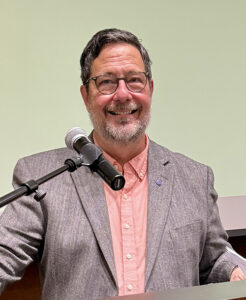Scholar-in-Residence in Jewish Studies
and Jewish-Christian Relations
Thomas M. Bolin (2025-26)

Thomas M. Bolin is a scholar of the Hebrew Bible and early Judaism whose work focuses on the creation of early Jewish texts and their subsequent interpretation by Jewish and Christian readers, Throughout his 30-year career, Bolin has drawn attention to the persistence of anti-Jewish and superssessionist elements in academic biblical scholarship, beginning with his 1997 book, Freedom Beyond Forgiveness: The Book of Jonah Re-Examined and including his 2012 commentary on Ezra-Nehemiah. He has also made a strong case for the importance of Jewish reception history in illuminating biblical texts, most notably in his 2017 book, Ecclesiastes and the Riddle of Authorship.
His most recent book, A Word in Season: Reading the Bible Responsibly in a Polarized World (2025) seeks to clarify the way the Bible is used in fraught social and political issues in the hope of encouraging greater understanding among readers on opposite sides of these debates. In addition to numerous articles that explore further issues in Jonah, Ecclesiastes, and Job, he has also written on the role of Jewish wisdom in the New Testament Letter of James, the teachings of the Second Vatican Council on the Bible, and the history of the Jewish community of Rome. He is currently a consultor to the United States Conference of Catholic Bishops on the translation of scriptural texts. Prior to his arrival at Providence College, he was a full professor of theology and religious studies at St. Norbert College in Wisconsin.
“Jewish-Christian dialogue is essential insofar as it keeps in mind the oftentimes inglorious history of the Church’s treatment of Jews while also calling Christians in the present to know, understand, and love as individuals the people whom God first called. Happily, there is a long and rich history of Jewish-Christian dialogue at Providence College and committed conversation partners in both communities. Working together for the common good in Providence and engaging in ongoing conversations about respective theological traditions and core beliefs are the practices that will keep this relationship vibrant. Dialogue participants work to cultivate the habits of presence and deep listening, because dialogue is, fundamentally, not simply something one does but rather is a way of being in the world, open to and curious about others.”
— Professor Thomas Bolin
Thomas Bolin
Scholar-In-Residence
Siena Hall 216
401.865.1351
tbolin@providence.edu
Dr Arthur Urbano
Professor of Theology and Chair of the JCTE
St. Catherine of Siena Hall 216
401.865.1351
aurbano@providence.edu





